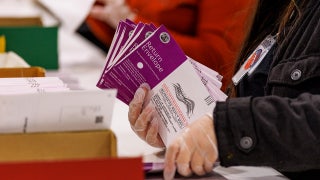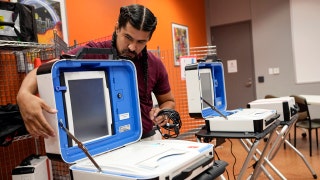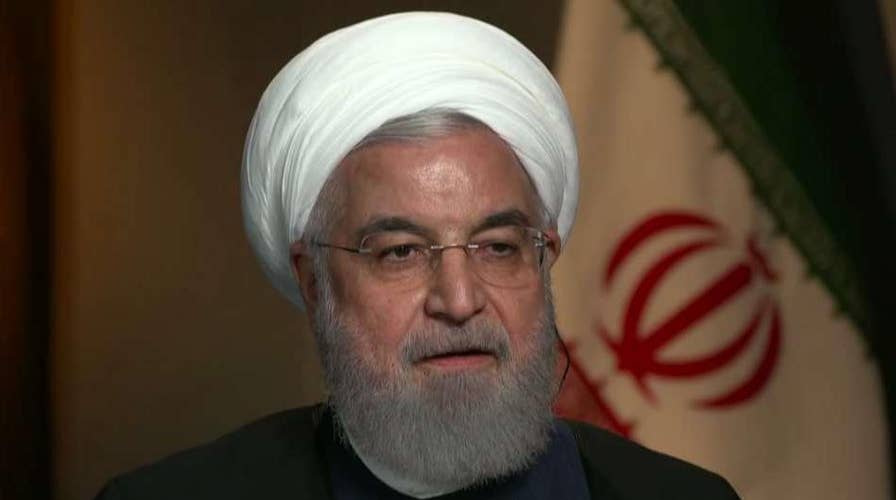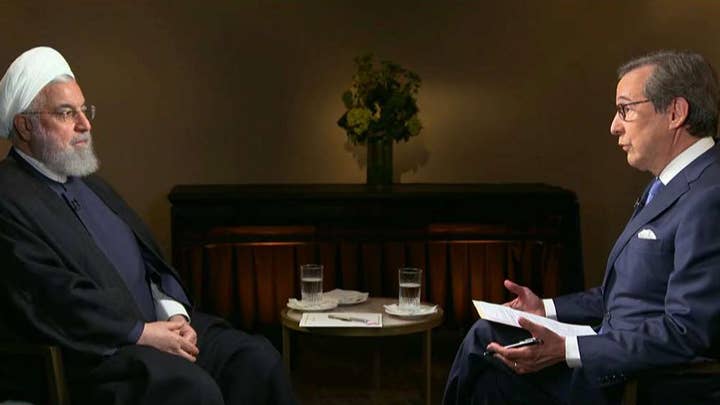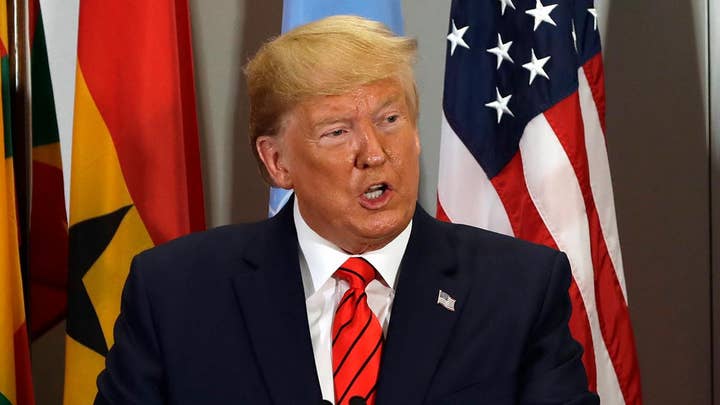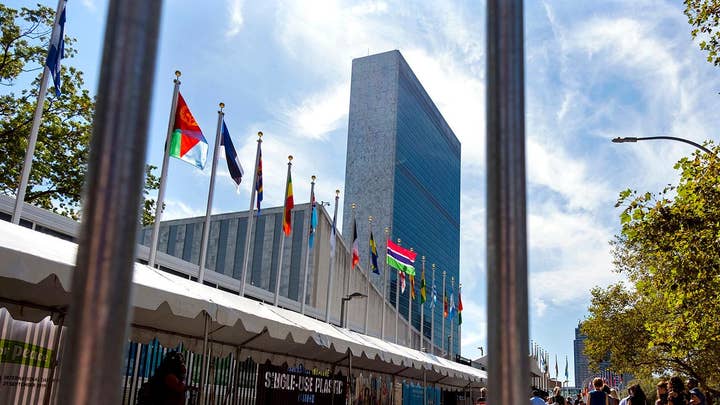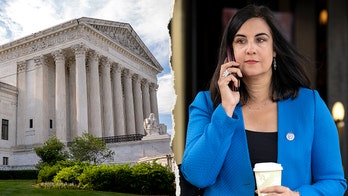Rouhani: America is the supporter of terrorism in our region
Iranian President Hassan Rouhani on tensions with the U.S. during an exclusive interview with Chris Wallace.
NEW YORK CITY – Iranian President Hassan Rouhani all but closed the door on potentially meeting with President Trump this week, blamed the commander-in-chief for damaging relations between the two countries and denied Tehran's involvement in the bombing of Saudi oilfields earlier this month in an exclusive interview with Fox News' Chris Wallace on Tuesday.
Rouhani, in New York for the United Nations General Assembly, was asked if there was any chance the two leaders would speak to each other this week.
"Why would we bump into one another?" the Iranian leader told Wallace. "If we seek to pursue higher goals to benefit both countries, both people, it must be planned, and talks must be based on those plans.
"But prior to that, we must create mutual trust, and the trust that is something that Mr. Trump took away from this framework. We had an agreement. Mr. Trump exited without a valid justification, and illegally, from an international agreement.
"So, if the United States of America’s government is willing to talk, it must create the needed conditions."
The comments came after Trump said Sunday he had "no intention" of meeting with Rouhani during the summit in New York City. "Nothing is ever off the table completely, but I have no intention of meeting with Iran," Trump told reporters.
Later in Tuesday's exclusive interview, the "Fox News Sunday" anchor pressed Rouhani, saying other nations that signed onto the controversial deal have since said they agreed with the stance that Trump took, citing the United Kingdom, France and Germany, before asking if there was a chance the U.S. and Iran could reopen talks.
ROUHANI SAYS IRAN'S RESPONSE TO BILATERAL TALKS WILL ALWAYS BE NEGATIVE
Rouhani replied: "Well, once we carried on negotiations with the United States of America for two years, and during a 17-day period, the foreign minister of the Islamic Republic of Iran and the U.S. Secretary of State had continuous talks without returning to their countries. It was extremely difficult, but we did reach an agreement which was signed, and it was enshrined in the United Nations Security Council resolution, and without a valid reason or cause, the United States left this agreement.
"So, it took away the foundation of the needed trust. I think more than the issues it touched upon, the most basic needed issue is trust, and Mr. Trump damaged the trust between the two countries. So, this is very important."
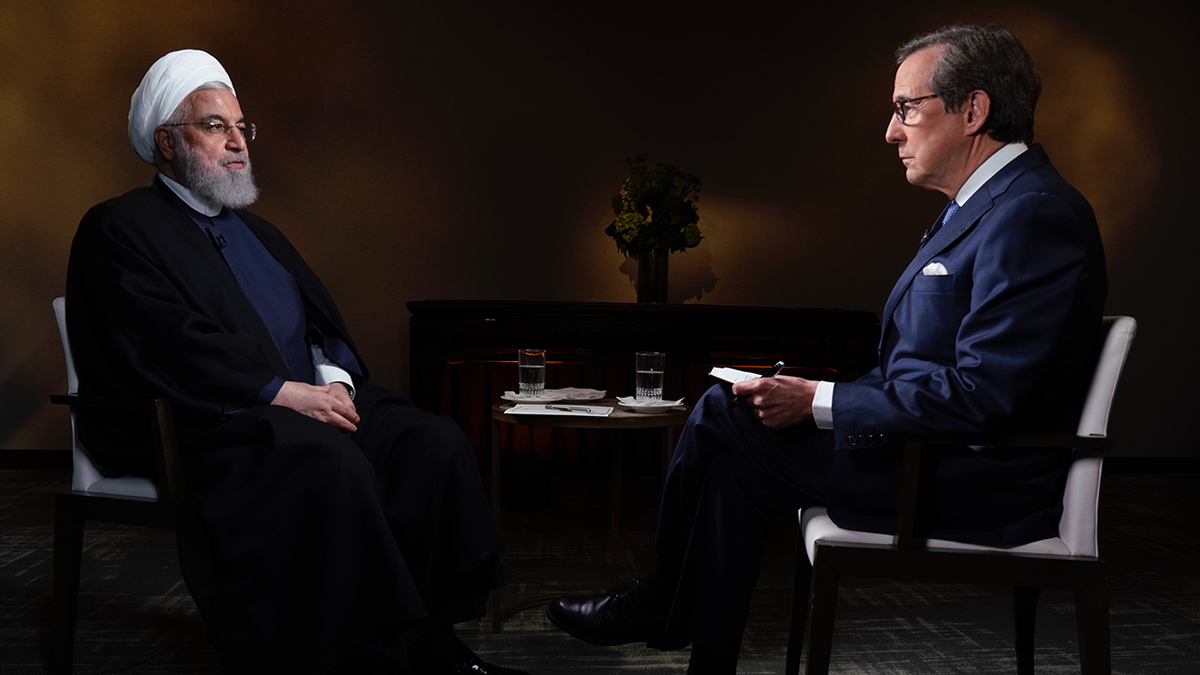
Rouhani sat down with Chris Wallace on Tuesday. (Fox News)
Rouhani then suggested a key way to rebuilding trust would be removing sanctions against his country, which he described as "a type of terrorism."
He continued, "Trust must be restored, and the restoration of trust consists in taking away the pressure imposed upon the nation and the people of Iran which show that clearly there is animosity even towards our children, our ill people, because we -- they even have difficulty in obtaining basic medications and medical equipment."
Rouhani went on, "This is a type of terrorism. This is inhumane, and if there is a cessation to this, then, of course, the atmosphere will change. Of course, then it can be envisioned, and we can talk about many different topics of mutual interest for both sides."
Rouhani repeated Tehran's denials that it was behind the Sept. 14 bombing of Saudi oilfields. The U.S., France, England and Germany all believe Iran was responsible for the attack, which was carried out with missiles and drones. The Shiite Muslim government of Iran and the Sunni royal family in Saudi Arabia have long been at odds and fighting a proxy war in Yemen, where the Iranian-backed Houthi forces claimed responsibility for the attack.
"...the [Saudi Arabian] spokesperson who thinks all Iranians are Shiites and Yemeni are not Shiites, that person is mistaken," Rouhani said. "Those who share in the bloodshed of the Yemeni people have nor right to make such unfounded expressions."
Earlier in the interview, Rouhani claimed that America, not Iran, was the key supporter of Middle East terrorism.
"I am amazed at the interpretations of Mr. Trump, vis-a-vis terrorism," Rouhani said.
"Today, America, unfortunately, is the supporter of terrorism in our region -- and wherever America has gone, terrorism has expanded in the wake."
Rouhani pointed to U.S. military involvement in Syria without the permission of President Bashar al-Assad as an example of what he considered to be such American 'terrorism.'
"The country that is present and flying over the air space of and bombarding the soil of the country of Syria without permission of the government is the United States of America."

Rouhani said he was surprised by how Trump called Iran a key supporter of Mideast terrorism. (Fox News)
Wallace had asked Rouhani about Trump's U.N. speech earlier Tuesday, in which he referenced Iran's "blood lust" and "fanatical quest for nuclear weapons" when the Iranian leader gave that response.
Earlier this month, Rouhani told the British Parliament in a speech that Tehran would continue to deflect Washington's overtures for a bilateral meeting.
“There have been a lot of offers for talks but our answer will always be negative,” he said according to the BBC .
CLICK HERE TO GET THE FOX NEWS APP
However, Iran would be open to having multilateral talks if the U.S. agreed to scrap its economic penalties targeting Iran, Rouhani noted.
In 2015, the P5+1 -- the U.S., the U.K., China, France and Russia, plus Germany -- penned a nuclear pact with Iran and the European Union. President Trump announced last year that the United States was leaving the Joint Comprehensive Plan of Action, which he called "the worst deal ever” for America, maintaining that Iran was violating the deal.
Fox News' Chris Wallace, Charles Creitz and Melissa Leon contributed to this report.


















